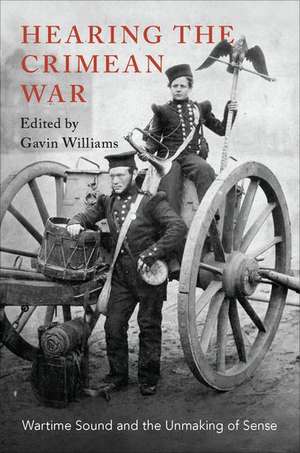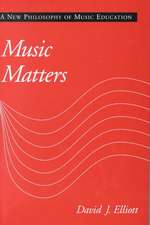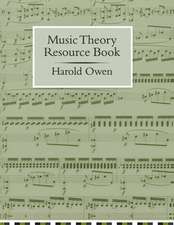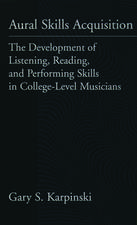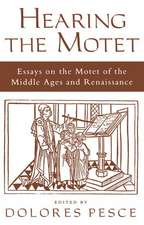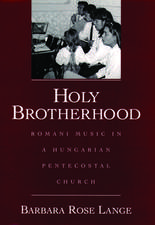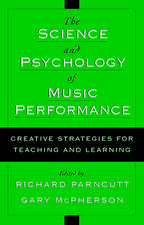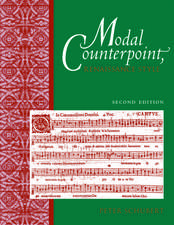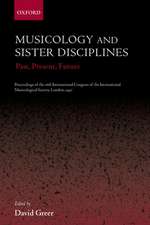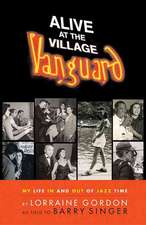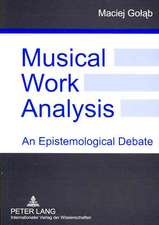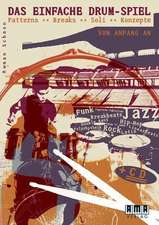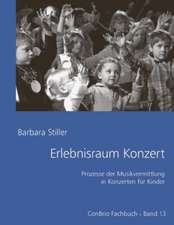Hearing the Crimean War: Wartime Sound and the Unmaking of Sense
Editat de Gavin Williamsen Limba Engleză Hardback – 21 feb 2019
| Toate formatele și edițiile | Preț | Express |
|---|---|---|
| Paperback (1) | 274.51 lei 10-17 zile | |
| Oxford University Press – 21 feb 2019 | 274.51 lei 10-17 zile | |
| Hardback (1) | 718.19 lei 31-38 zile | |
| Oxford University Press – 21 feb 2019 | 718.19 lei 31-38 zile |
Preț: 718.19 lei
Preț vechi: 1041.60 lei
-31% Nou
Puncte Express: 1077
Preț estimativ în valută:
137.43€ • 146.96$ • 114.58£
137.43€ • 146.96$ • 114.58£
Carte tipărită la comandă
Livrare economică 07-14 aprilie
Preluare comenzi: 021 569.72.76
Specificații
ISBN-13: 9780190916749
ISBN-10: 0190916745
Pagini: 324
Ilustrații: 12 line, 4 halftones
Dimensiuni: 239 x 160 x 23 mm
Greutate: 0.68 kg
Editura: Oxford University Press
Colecția OUP USA
Locul publicării:New York, United States
ISBN-10: 0190916745
Pagini: 324
Ilustrații: 12 line, 4 halftones
Dimensiuni: 239 x 160 x 23 mm
Greutate: 0.68 kg
Editura: Oxford University Press
Colecția OUP USA
Locul publicării:New York, United States
Recenzii
This focused collection of essays explores the soundscapes of the Crimean War from an admirably diverse range of disciplinary and geographical perspectives. In doing so, it not only offers an ambitious rethinking of the transnational phenomenon of the Crimean War but also serves as a ground-breaking exemplar for the historical study of aurality.
[...] throughout this collection, silence and sound, real and imaginary, are not conceived as dichotomies, but phenomena that constantly intertwine. Listening practices and hearing experiences are documented with an ear for how real events are captured while being mediated by their context, and this approach also shows how recorded sounds can silence, and silence can unearth, sonic phenomena and perceptions.
[...] the collection attempts to amplify the silences of the archives: what was communicated, recorded, and what has been omitted from history? Where were the notable gaps? Where was media's activity, its non-neutrality, most evident, and how did it shape the war itself in addition to public perception? Sound and silence thus become, far from opposites of one another, two sides of the same coin, both worthy objects of study for the authors of the collection.
Recommended.
Hearing the Crimean War offers a crucial contribution not only to historical sound studies, but also to scholarly discourse on sound and affect in wartime. With essays that address the many forms of media in which sound and sense came to be inscribed during the Crimean War-from literature, legal texts, and news articles to opera, popular song, and silence- this book and its authors provide a profoundly interdisciplinary account, impressive it in its historical and methodological scope, of how this global conflict was understood and remembered by those who lived through it.
This relentlessly brilliant volume, bringing together sound studies scholars, musicologists, ethnomusicologists, literary scholars and cultural historians, will provoke lively, and timely, discussion of musicology's 'sonic turn'. The various soundscapes of the Crimean War take shape - and melt back into air - in these pages, both on and far beyond the battlefield. Williams' chief contention is that the global moment signaled and shaped by the Crimea conflict anticipates and complicates our understanding of those of the present day. This volume will continue to raise questions about them long into the future.
[...] throughout this collection, silence and sound, real and imaginary, are not conceived as dichotomies, but phenomena that constantly intertwine. Listening practices and hearing experiences are documented with an ear for how real events are captured while being mediated by their context, and this approach also shows how recorded sounds can silence, and silence can unearth, sonic phenomena and perceptions.
[...] the collection attempts to amplify the silences of the archives: what was communicated, recorded, and what has been omitted from history? Where were the notable gaps? Where was media's activity, its non-neutrality, most evident, and how did it shape the war itself in addition to public perception? Sound and silence thus become, far from opposites of one another, two sides of the same coin, both worthy objects of study for the authors of the collection.
Recommended.
Hearing the Crimean War offers a crucial contribution not only to historical sound studies, but also to scholarly discourse on sound and affect in wartime. With essays that address the many forms of media in which sound and sense came to be inscribed during the Crimean War-from literature, legal texts, and news articles to opera, popular song, and silence- this book and its authors provide a profoundly interdisciplinary account, impressive it in its historical and methodological scope, of how this global conflict was understood and remembered by those who lived through it.
This relentlessly brilliant volume, bringing together sound studies scholars, musicologists, ethnomusicologists, literary scholars and cultural historians, will provoke lively, and timely, discussion of musicology's 'sonic turn'. The various soundscapes of the Crimean War take shape - and melt back into air - in these pages, both on and far beyond the battlefield. Williams' chief contention is that the global moment signaled and shaped by the Crimea conflict anticipates and complicates our understanding of those of the present day. This volume will continue to raise questions about them long into the future.
Notă biografică
Gavin Williams is a musicologist and Leverhulme Early Career Research Fellow at King's College London. He wrote a PhD dissertation at Harvard University on sound and media in Milan ca. 1900, and was then a postdoctoral fellow at Jesus College, Cambridge. He has published articles and book chapters on Futurist music, Italian opera and ballet, and soundscapes in nineteenth-century London, and is currently writing a book on the imperial geographies of recorded sound during the first half of the twentieth century.
